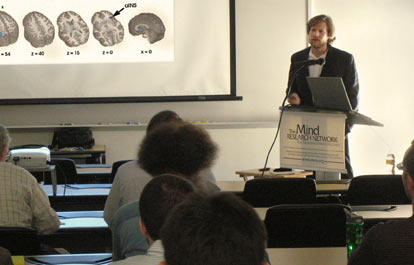

Scientific Lectures //
Socio-Neuro Risk Factors for Suicide in Ultra-High-Risk Populations
Carla Harenski, Ph.D., Asistant Professor of Translational Neuroscience, the Mind Research Network
Presented: August 23, 2016
ABSTRACT: Disturbances in social behavior are a core feature of psychotic disorders. Underlying these disturbances are impairments in several domains of social cognition including emotion perception and mental state attribution. Social cognitive impairments may engender feelings of social disconnection and isolation, which increase risk of suicidal ideation and/or behavior. Although psychotic disorders are associated with social cognitive impairments and elevated suicide risk, the direct association between social cognition and suicidal behavior in psychotic disorders has not been well-studied. Nor has it been studied in other populations with elevated suicide risk, such as criminal offenders. We examined social cognitive skills and brain volume in social cognition networks (using voxel-based and source-based morphometry) in three suicide risk groups: community psychotic patients, criminal offenders, and an ultra-high-risk group of psychotic offenders. There were three key results: 1. Previously established suicide risk variables in the general population differed in their relevance to suicidal behavior across the three groups, 2. Social cognitive impairment was significantly associated with suicidal behavior, 3. Reduced gray matter volume in social processing networks was significantly associated with suicidal behavior. The results suggest that social cognitive and neuroimaging measures may be relevant to risk assessment for suicide in high-risk populations.
To view this presentation please click here.

